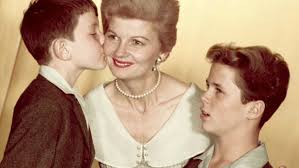 At National Review, Mona Charon writes about an extensive study reported in the journal Translational Psychiatry: “Sex differences in recent first-onset depression in an epidemiological sample of adolescents.” (Here’s an abstract of the study) The sex difference findings are interesting—teen girls are twice as likely as boys to feel depressed—but the real punch to the gut is in the sheer numbers of kids who manifest severe anxiety, depression, and other forms of mental illness: about one in four.
At National Review, Mona Charon writes about an extensive study reported in the journal Translational Psychiatry: “Sex differences in recent first-onset depression in an epidemiological sample of adolescents.” (Here’s an abstract of the study) The sex difference findings are interesting—teen girls are twice as likely as boys to feel depressed—but the real punch to the gut is in the sheer numbers of kids who manifest severe anxiety, depression, and other forms of mental illness: about one in four.
Could this be due to more awareness of mental health issues, and better reporting? Less stigma or ignorance about depression, or even increased self-dramatizing among teens? Maybe a little, but a pediatrician responding the Charon’s column on another website added an informal statistic that makes it real. While reading, he checked his phone for the current status of the Emergency Department in the children’s hospital where he worked. At that moment, 28% of patients were there for “suicidal ideation.” “What Mona Charon writes about is the lived experience of every children’s hospital around . . . This is a national crisis.”
People were less depressed during the Great Depression.
People were less depressed during the Great Depression.
The two obvious questions are Why is this happening now? and What should we do?
As to why, social media, family breakdown, economic anxiety, political turmoil (it’s Trump’s fault!), and education all come in for blame. But what do kids need that they’re not getting? Pretty much the same things we all need, which are
- Meaningful relationships. I would trace most of our social problems to no-fault divorce, which made the most essential social bond a matter of personal preference. Since then, children have had the rug pulled out from under them. Single-parenting is a huge predictor of all kinds of negatives, from low school performance to relationship failures in adulthood. In the teen years, when kids begin the transition from parental relationships to peers and others (which should eventually lead to stable marriages of their own), social media is lurking for them. Instead of bonding with friends, they bond with their devices. Their real friends are their phones.
- Meaningful education. Somewhere in the early 20th century, public education began to divorce brains from souls. Reductionism took over: humans can dream up whatever metaphysical system they want in their spare time, but at school, we’re all utilitarians. Transcendence has no place in a melting-pot schoolhouse where not everybody shares the same religion or philosophy. This wasn’t so obvious in my southern-culture elementary school, with our morning devotionals and music classes, but the trend was in place–it’s the subject of The Abolition of Man, a brief treatise that C. S. Lewis considered his most important work. The intense focus is on academics now, to the detriment of the arts and even recess. That’s because we’re educating brains, not people, and the supplementary education kids used to get from church or their parents is less likely to be there for them.
Those three summer jobs were at least as useful to me as the classes I took in school.
- Meaningful work. Who likes working? I didn’t. My mother had to push me out the door to get a
job after graduating high school—otherwise, she said, no college. I didn’t have the best reasons for going to college and no clear idea of what I wanted to do, but it was that or a full-time job. Horrors! Summer jobs were bad enough. And yet, those three summer jobs were at least as useful to me as the classes I took in school: practical experience, being responsible, listening to instruction, getting chewed out when I didn’t. (“At least you didn’t cry,” said my supervisor after one of those times, just before I escaped to the bathroom and bawled my eyes out.) Every legitimate job is meaningful because it connects the individual to his community and creates a sense of obligation (as opposed to entitlement). You show up; you do the job; you get paid. Less than half of Americans get jobs while still in their teen years, and when they do enter the work force in their mid-twenties, they don’t seem to know what to expect. I hear about millennials who have to be corrected carefully so as not to ruffle their feathers, and who get frustrated after eight months because they’re not “having an impact.” Then there are those blue-collar dropouts who simply don’t show up.
it connects the individual to his community and creates a sense of obligation (as opposed to entitlement). You show up; you do the job; you get paid. Less than half of Americans get jobs while still in their teen years, and when they do enter the work force in their mid-twenties, they don’t seem to know what to expect. I hear about millennials who have to be corrected carefully so as not to ruffle their feathers, and who get frustrated after eight months because they’re not “having an impact.” Then there are those blue-collar dropouts who simply don’t show up. - Meaning, period. Q: What is the chief end of man? A: The chief end of man is to glorify God and enjoy him forever. (Westminster Shorter Catechism, Question #1) What can beat that for significance in life and death? There you have it all: relationship, education, work—and heaven besides. Even an atheist, whose philosophy offers him no objective reason for meaning in anything, can find it in family, art, democracy, benevolence, etc. But it takes a strong will and other advantages, such a good parents, to find your own meaning in life once you’re turned loose to live it. And if your life ultimately means nothing, why not OD on heroin and end it sooner?
We despise our youth, loading them up with the accoutrements of adulthood without expecting them to act like adults.
And that’s what we do: turn them loose. A 16-year-old girl gets mixed messages about empowerment and victimization, while she longs for a loving relationship; a 19-year-old boy is told he’s toxic and unnecessary, while he inarticulately searches for some dragon to slay. We despise our youth, loading them up with the accoutrements of adulthood (sex, cars, phones) but not expecting them to act like adults.
What to do? Rescue them, one at a time.





 Is it a coincidence that so many fairy tales and traditional stories in the western tradition end with a wedding? But they never continue with a marriage, beyond “and they lived happily ever after.”
Is it a coincidence that so many fairy tales and traditional stories in the western tradition end with a wedding? But they never continue with a marriage, beyond “and they lived happily ever after.”






